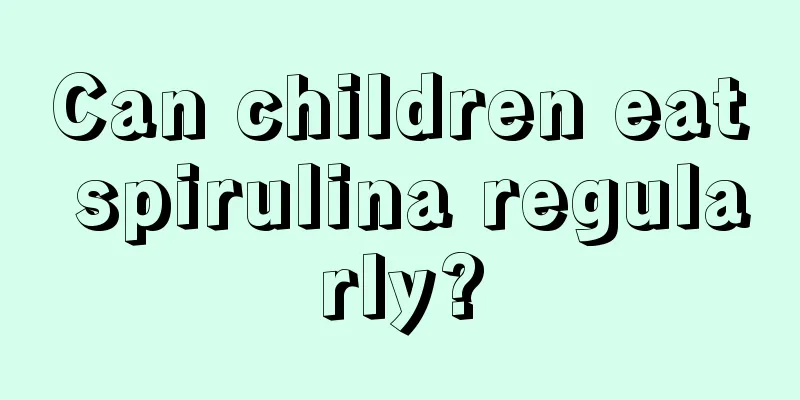Why does the baby sweat and smell?

|
The healthy growth of the baby is what parents hope for. Some babies have smelly sweat. Generally, if the baby sweats for a short time to clean the skin, there will be no odor. But some babies may have odor as soon as they sweat, which makes parents more worried. They don’t know why the baby sweats and smells. What is the reason for the baby’s smelly sweat? Let’s take a look at it next. 1. Physiological sweating It is common for babies to sweat during sleep, and it is not always a symptom of weakness or illness. Many parents believe that their children’s constant sweating is due to their weak constitution. In fact, a considerable number of children suffer from physiological hyperhidrosis. Physiological hyperhidrosis is more common in the head and neck, often occurring within half an hour after falling asleep, and sweating stops in about an hour. Infants and young children have an active metabolism and are active and lively. Some of them cannot rest even after going to bed at night, so they may sweat on their heads after falling asleep. The so-called physiological hyperhidrosis refers to sweating during sleep when the child is well-developed, healthy, and has no disease. Parents are often accustomed to deciding the best environmental temperature for their children based on their own subjective feelings, and like to cover their babies with more blankets and keep them tightly covered. Because children's brain and nervous system are not yet fully developed and they are in the growth and development period, their body metabolism is very active. Coupled with the stimulation of overheating, they can only regulate normal body temperature by sweating to evaporate the heat in the body. In addition, drinking milk, malted milk or eating chocolate before going to bed can also cause sweating in children. Some parents give their children milk, malted milk, etc. before they go to sleep. After the child falls asleep, the body produces a large amount of heat, which is mainly dissipated through sweating through the skin. In addition, too high room temperature or excessive warmth can also cause children to sweat while sleeping, which are all physiological sweating. 2. Pathological sweating Pathological sweating occurs when the child is in a quiet state, such as sweating caused by rickets, which manifests as obvious sweating on the child's head in the first half of the night after falling asleep. Because the pillow is stimulated by sweat, babies often shake their heads and rub against the pillow when they sleep, resulting in sparse hair and loss of hair on the pillow, forming typical annular hair loss on the pillow, which is medically known as "occipital baldness". It is an early manifestation of rickets in infants. As long as vitamin D and calcium are supplemented in time, rickets can be controlled and sweating will stop by itself. If a child sweats not only in the first half of the night but also in the second half of the night and before dawn, it is usually a sign of illness, the most common of which is tuberculosis. Tuberculosis also has other symptoms, such as low fever, fatigue, loss of appetite, flushed cheeks, etc. Children with tuberculosis tend to sweat easily during daytime activities, which is called spontaneous sweating, and sweating at night is called night sweats. If you suspect your child is infected with tuberculosis, a lung X-ray or a tuberculin test should be done for timely diagnosis and treatment. 3. Notes Children with weak constitutions often sweat in patches on their head, chest, and back when they are active during the day or after falling asleep at night. It is often caused by malnutrition due to improper feeding or poor digestion and absorption. In terms of nursing, attention should be paid to adjusting feeding methods, promoting children's appetite, and increasing the intake of protein, fat and sugar. If necessary, traditional Chinese medicine can be used to regulate spleen and stomach disharmony. |
<<: The baby's poop is like tofu dregs
>>: Can a one-year-old baby clean earwax?
Recommend
There are small white spots on the nose of the newborn
The skin of a newborn baby is very fragile becaus...
What to do if your child has a thick tongue coating
The tongue of a healthy baby is generally pink, t...
What is the best treatment for strep throat in children?
Many parents whose children have strep throat won...
What to do if a 5-year-old child has diarrhea
It is common for children to have diarrhea becaus...
What to do if your child has itchy feet
Tinea pedis, also known as athlete's foot, is...
Why do children only have fever and no other symptoms?
Fever often occurs after a cold, so it is not wro...
Does a baby with a broken palm have Down syndrome?
Many babies with Down syndrome have a broken palm...
What to do if your newborn is fussy
In today's society, children are treasures in...
What to do if your baby has jaundice
Jaundice is a common symptom among many newborns....
How to improve children's memory
How can we strengthen children's memory? When...
Can a 1 year old child eat mango?
Children around one year old may be in the weanin...
Symptoms of anemia in one-year-old babies
Anemia in babies is a rather troublesome matter, ...
Why does it happen that babies have difficulty pooping?
Difficulty in defecation for babies is a very com...
What should I do if my child still can’t speak at the age of 3?
Every child starts talking at a different time. M...
The color of your stool as jaundice subsides
The color of stool will also change during the pe...









